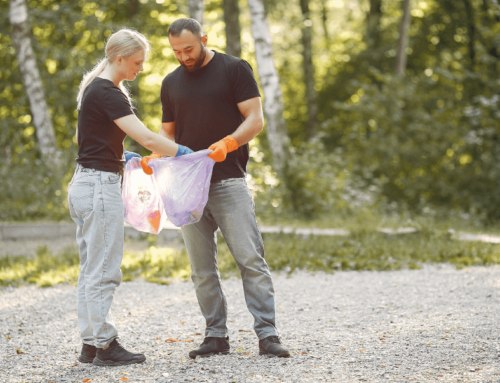The future of our planet rests on our shoulders. Fortunately, it’s easier to make a difference than you think.
When it comes to going green, there are several things you can do when you shop for groceries, goods, and services to support a healthier, cleaner environment. Here are 11 sustainable shopping tips to help you put your money in greener, more eco-friendly places.
Why Is Sustainable Shopping Important?
Sustainable products are made with the planet’s health in mind. Traditional shopping habits and consumerism strain the earth due to overconsumption, resource depletion, and needless waste.
Sustainable products, however, help the environment by reducing environmental stress caused by pollution and wasteful manufacturing practices. Sustainable companies and products practice conservation and smart energy usage to cut down on global emissions and preserve the planet’s resources.
11 Sustainable Shopping Tips
These green shopping tips can help you become a more mindful, eco-conscious consumer.
1. Make a List
One of the primary environmental concerns is the amount of waste each household generates every year. In fact, in 2018, Americans produced 292 million tons of trash, just under 2,000 pounds per person.
One way to cut down on needless waste is to make sure you’re only buying what you need and know you will use. If you’re prone to impulse buying, it can be helpful to make a list and plan ahead before you head to the store, so you don’t end up throwing away spoiled or uneaten food.
2. Buy Secondhand
Thanks to increased consumer demand, the world of fast fashion continues to produce cheap, trendy clothing designed to wear for just a few months or one seasonal trend cycle. This means a large number of garments end up at thrift stores. But when they’re out of style, they are unlikely to get purchased and more likely to end up in landfills.
It isn’t just clothing that gets tossed. Appliances, electronics, books, toys, and other housewares often end up in the garbage to make way for household upgrades.
Shopping at secondhand stores can be gentler on your wallet, but it also cuts down on demand for new goods and keeps otherwise functional items out of landfills. Many secondhand stores are linked to charities and philanthropic organizations, so your dollar does even more good for your community.
3. Shop Local
Manufacturers use many nonrenewable resources to fuel their warehouses and shipping trucks. And ocean-going shipping uses over 300 million tons of fossil fuels and contributes up to 3% of global greenhouse gas emissions in a single year.
The solution? Shop locally. Community food co-ops, farmers’ markets, and locally owned brick-and-mortar stores use much less fuel to transport their products from the source to their shelves.
4. Avoid Plastic
The need for sustainable packaging is more apparent than ever as non-biodegradable plastic continues to pollute the environment with microplastics, threatening wildlife by infiltrating our ecosystems.
While recycling plastic is an excellent way to give plastic products and packaging a chance at a new life, take it a step further and look for better alternatives. Try to purchase packaging with cardboard or other biodegradable materials, and refuse to use single-use plastic as often as possible.
5. Bring a Bag
Only a small percentage of plastic grocery bags are recycled each year, so bringing a reusable bag with you on each shopping trip is an incredibly eco-conscious choice. A reusable grocery bag can replace over 22,000 plastic bags over its lifetime, conserving the natural resources used to produce more of them as well.
6. Buy Organic
When it comes to food products, there are more reasons to choose goods labeled organic than just your health. Organic farming is far more sustainable than traditional industrial farming in many ways, so your purchase supports farms that contribute less to pollution and harmful or synthetic chemicals that can end up in nearby habitats.
7. Support Small Businesses
Mass-produced items are often convenient but are not always created with environmentally friendly practices.
On the other hand, small businesses, especially with handmade or locally crafted products, produce products on a smaller scale, which makes the maker-to-customer journey much shorter. This, in turn, uses fewer resources.
Small businesses are also more likely to ethically produce their products than larger companies, particularly those that outsource production to other countries.
8. Think Long-Term
Some products just aren’t built to last. Likewise, some purchases aren’t made with longevity in mind. If you tend to purchase items you may only use once or plan to toss after an event, it’s a good idea to keep the bigger picture in mind.
For this eco-friendly shopping tip, try to buy things you know you’ll use for a lifetime, even if this means saving up a little extra for the high-quality or more durable option. Some items, such as quality cookware, well-built toys, and well-made clothing, can even be handed down from generation to generation.
9. Check for Certifications
Due to the growing demand for eco-friendly products, many independent tests and certifications can let you know if what you’re buying is genuinely eco-friendly and not just clever marketing or greenwashing. A few green business certifications include:
- Fair Trade USA Certified
- USDA Organic
- Green Business Bureau (GBB)
- Energy Star
- Safer Choice
- WaterSense
- OEKO-TEX
Green certifications indicate that products are produced by companies dedicated to environmentally-friendly practices, such as water conservation, fair labor, safe chemical use, organic materials, earth-friendly fibers, and energy efficiency.
10. Use What You Have
Sometimes the best sustainable shopping tip is to avoid shopping altogether. Though it’s tempting to upgrade to the latest and greatest to have the most recent technology or versions of products, it isn’t exactly the most eco-friendly decision.
Make use of what you already have rather than tossing perfectly good items in favor of new ones just to purchase something new. If something can be repaired to make it fully functional or usable, look into that option before buying a replacement.
11. Visit Eco-Friendly Stores
From zero-waste stores to natural markets, some establishments are more dedicated to supporting environmentalism than others. These companies commit to greener business models such as bulk food shopping, package-free items, recycled materials, and sustainably sourced materials.
Environmentally Friendly and Sustainable Companies
One of the best green shopping tips? Supporting sustainable companies. These companies make it their business to protect our planet.
- Patagonia: Invests in repair centers to help their clothing last and reduce the need for new products.
- Lush: Cuts down on packaging and uses natural vegetarian and vegan ingredients.
- Seventh Generation: Produces bio-based, concentrated solutions that use less water.
- Nike: Recently dedicated to increased use of renewable energy sources and recycled polyester.
- A Good Company: Offers products with sustainable materials and shipping practices.
- Imperfect Foods: Stocks ugly or otherwise unusable produce and surplus food items.
- Native Foods: Refuses leather and instead uses recycled and biodegradable shoes.
- Stasher Bags: Offers reusable sandwich bags to cut down on single-use options.
- Kiwi Energy: Offers sustainable energy plans for efficient household consumption.
Beyond Sustainable Shopping Tips
Sustainable purchases go beyond just the clothes on your back and the food in your fridge. Learn more about Kiwi Energy’s environmentally friendly energy programs to make your home more sustainable. Don’t hesitate to get in touch if we can help you with anything. Better yet, enroll today.




